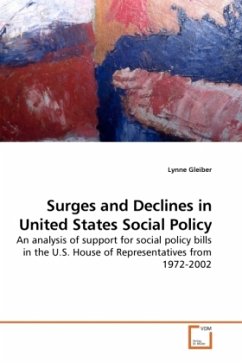Much of the literature in the field of Political Science is concerned with explaining voting behavior by legislators. The central research question in this study is what causes changes in voting behavior by members of the United States House of Representatives with regard to social welfare bills? This research focuses on determining which variables supercede personal ideology in the decision making process of members of Congress and at what times they intervene. Thus the main hypothesis is: When factors other than personal ideology become more important to the legislator, they will override ideology as the determinant of the vote. The factors that are expected to influence voting behavior besides ideology include: presidential influence; the condition of the economy; the presence of the Iran- Contra Scandal; the presence of the Monica Lewinsky Scandal; and the presence of Newt Gingrich as Speaker of the House. The influence of these factors is measured over a time span of 30 years. Factors such as the presence if Gingrich as Speaker of the House and the Whitehouse scandal involving Monica Lewinsky were associated with ebbs and flows of votes favoring social policy bills.







